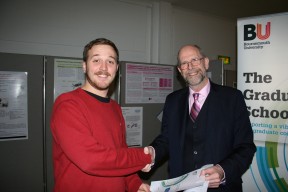Comedy writer Laurence Marks – who helped create some of Britain’s best loved sitcoms – shared his experiences with postgraduate students at Bournemouth University.
Laurence, who created the likes of Birds of a Feather and Goodnight Sweetheart with writing partner Maurice Gran, talked about his career to Master’s students from across BU’s Media School.
Laurence, who was a journalist before moving into writing, said the pair were inspired to begin writing together after winning competitions at a writing and acting workshop that they only attended because it was cheaper than heating their flats.
“I was a journalist, so I was at least writing and putting words on a page but I was a crime reporter, which is a long way from comedy,” he said.
“What I found was that the moment I sat down at my typewriter and started to write, not only did it flow out of me as if it had been welling up, but I had to write comedy. It was just flowing out of me.”
The pair’s first big hit was Shine On Harvey Moon, in 1982, and they then moved to Hollywood – where they were part of the team of writers working on Cheers.
After 14 months, they moved back to the UK and worked with Rik Mayall on political sitcom The New Statesman, which went on to win the BAFTA for Best Comedy Series.
Laurence told the students that, while writing in a partnership could be difficult, he would not want to do it alone.
“That instant feedback in comedy is your first audience,” he said.
“If he doesn’t laugh, ten million people aren’t going to laugh. I like to be in a room where there is somebody with you, crafting something. It’s more fun.”
“It helps if you know the person you are working with for a long, long time, as you have the same reference points.”
He added: “It was very difficult at first. Someone once said a writing partnership should be exactly the same as a marriage – except you never take your clothes off in front of each other.
“We argue all the time – the whole dynamic is argument and debate about what is going to work.”
He also likened writing to building a house – saying that you need an architect to make sure the structure is right before starting to decorate.
“Writing is the easy bit, like decorating,” he said. “But there is a lot of work to do before then in making sure the structure is right – it’s the planning, the story, the characters.”
His advice to the students – who came from Master’s courses including scriptwriting, cinematography and directing – was to find their own voice, and create characters that people wanted to watch.
“It is really first and foremost about character. You are building up this piece of a real person – because without truth, comedy doesn’t work,” he said.
“What we did was acknowledged what was being made and then wrote something different.
“Do what you want to do but it has to conform to what is, after all, a 28 minute show divided into 3 parts with great characters.”
 Bournemouth University
Bournemouth University